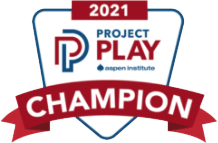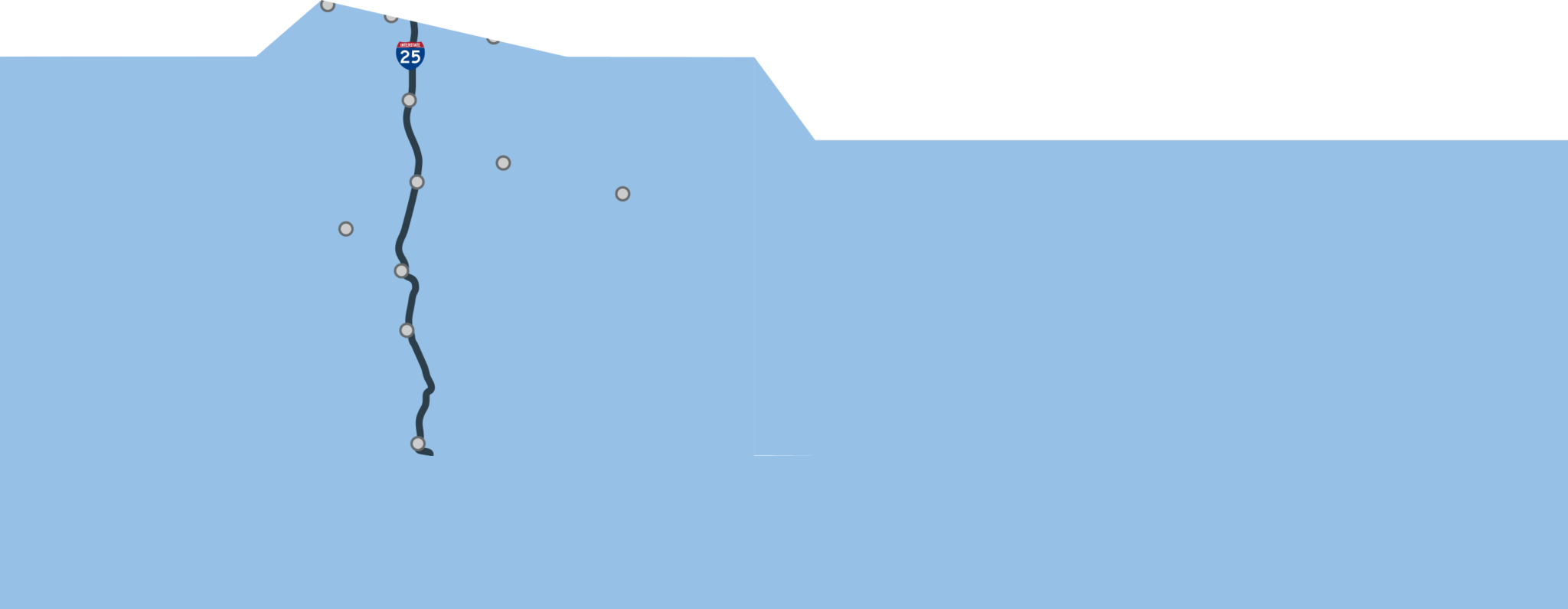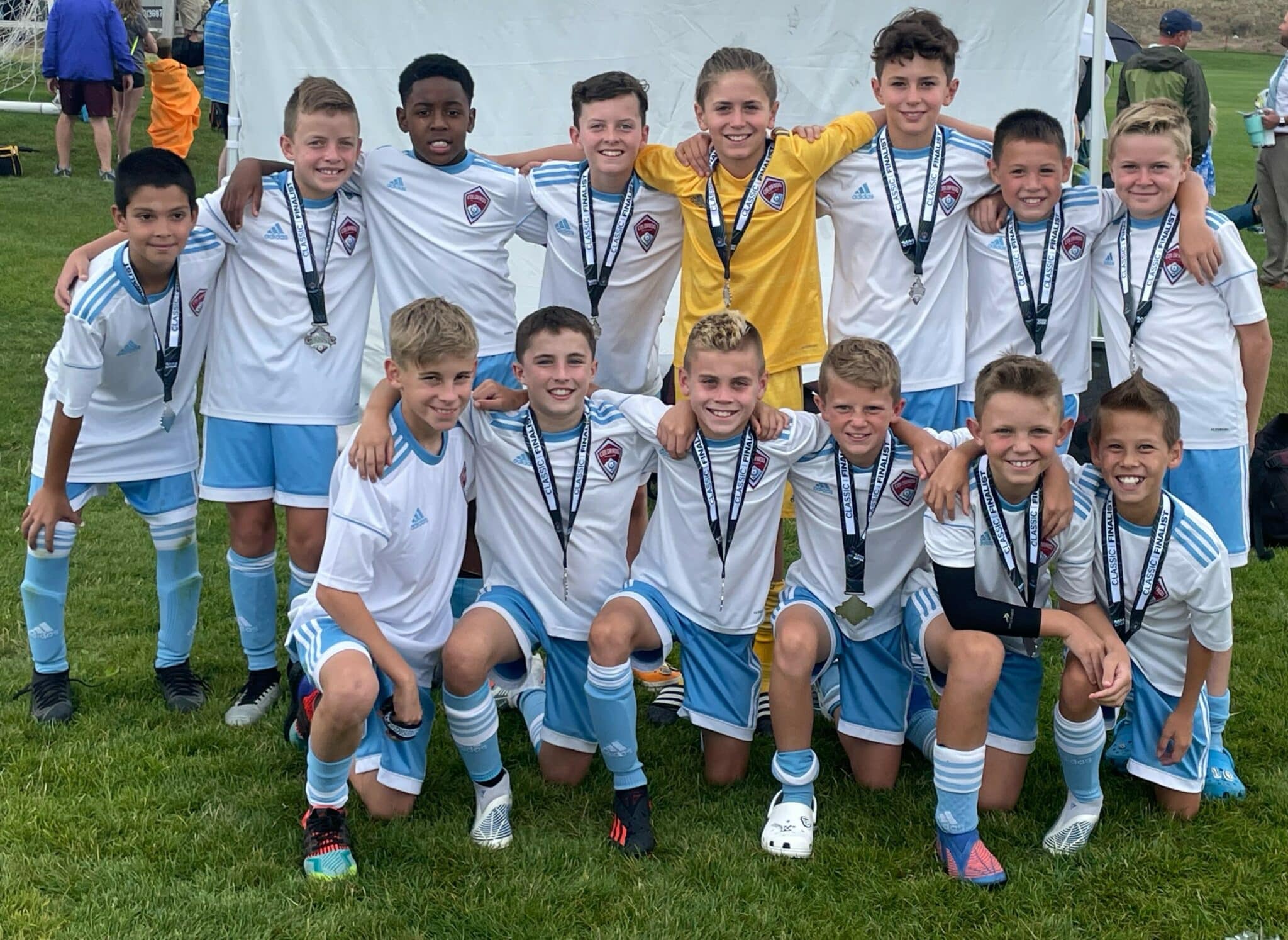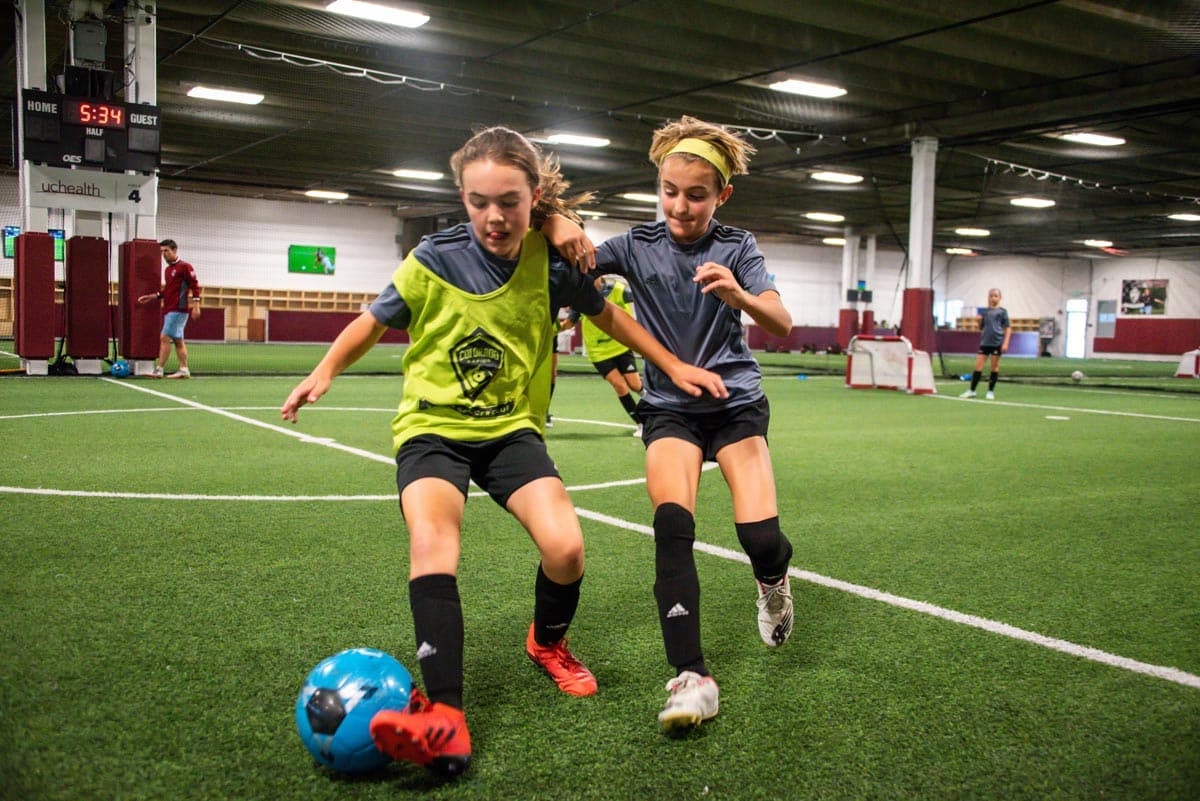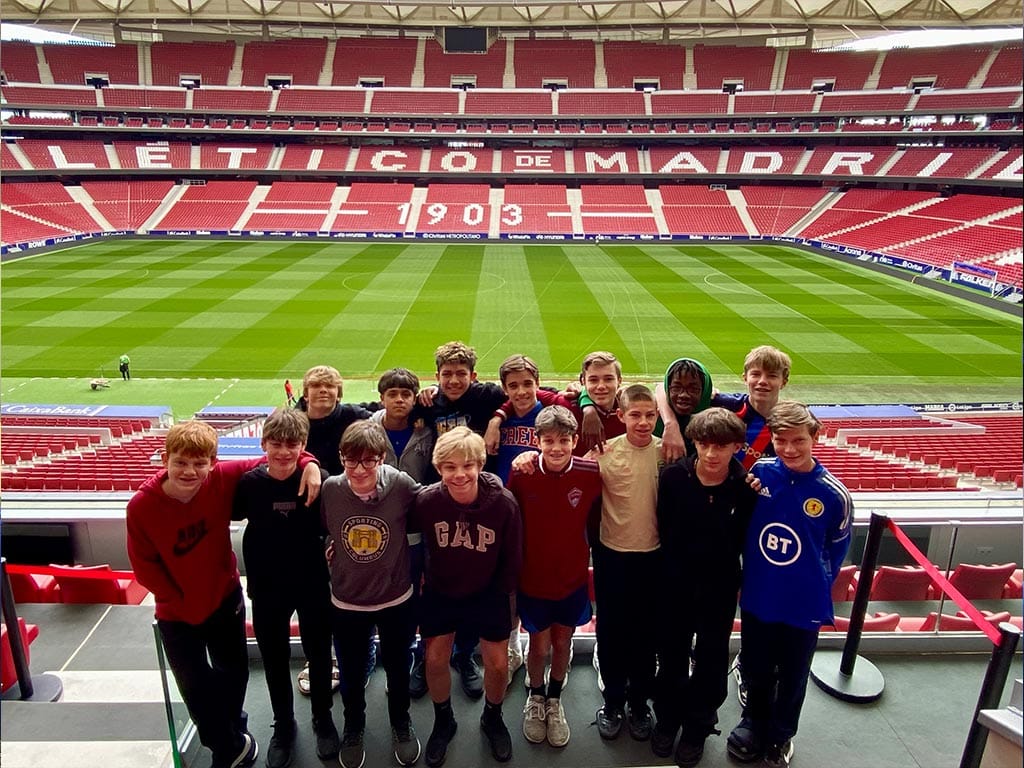CRYSC 11U-19U programming continues to build upon the technical foundation started in the 4U-10U programs and builds on the Colorado Rapids curriculum. Program offerings provide recreational options for all ages 11U through 19U.
Trainings are held at convenient, centralized, community locations in the Denver and Aurora metro areas. The game format is played in a 9v9 format from 11U-14U, though 13U-14U plays on a larger field. Team sizes of 12-15 players ensure plenty of game time to apply the skills and techniques that are presented in the twice-weekly curriculum-based training.
11U-14U teams participate in our Rapids Interbranch League. All games are held on Saturdays unless there is a need for a makeup that can fall on a Sunday or during the week. Home games are based out of Central Denver Parks, with away games across our South and Castle Rock regions. All schedules are communicated to the Volunteer Parent Coaches and Team Managers, who load them into PlayMetrics. Please refer to your PlayMetrics app for a calendar.
15U+ Rapids teams participate in the Front Range League with the Colorado Soccer Association. All games are held on Saturdays unless there is a need for a makeup that can fall on a Sunday or during the week. Home games are based out of Aurora Sports Park or the Gates Soccer Complex, with away games across the Front Range depending on the opposing team’s home location. All schedules are communicated to the Volunteer Parent Coaches and Team Managers, who load them into PlayMetrics. Please refer to your PlayMetrics app for a calendar.
| 11U-19U Recreational | 11U-19U Rec+ Training | ||||
|---|---|---|---|---|---|
| Player Attributes | Child enjoys soccer, especially for the fun and social atmosphere but needs motivating to practice at home. | Child loves soccer and practices at home when prompted. Child gets excited about practice and skill development. | |||
| Season | 8-9 week-long seasons | 8-9 week-long seasons | |||
| Coaching | Parent volunteer coach | Parent volunteer coach and staff training coach | |||
| League Play | 11U-14U: Rapids Interbranch League 15U and older: CSA Front Range League | 11U-14U: Rapids Interbranch League 15U and older: CSA Front Range League | |||
| Playing Format | 9v9 | 9v9 | |||
| Team Size | 12-15 players | 12-15 players |
The Whole-Part-Whole (WPW) philosophy is a learning model used by the Colorado Rapids Youth Soccer Club to train age-appropriate curriculum aimed at the long-term development of a soccer player. The WPW philosophy was first outlined by Malcolm Knowles in 1973 and is used in many learning situations, both practical and theory based. When added to a well-planned and well-thought out pedagogy, the WPW philosophy will put players in realistic situations, that should always includes decision-making elements.
When coaching soccer, this can be used in a variety of ways to break down a technique, skill, or tactic. Most commonly the players are taken from a practice with high game context to a low one, before returning back to the original practice. When possible it is best to practice the game, or elements of the game, in their entirety. An example of this could occur in a topic such as ‘Defending in the Direct Game Channel’. What do you do if the individuals or units in your squad don’t understand how to defend 1v1 or 2v2? You break it down.
‘Whole’ doesn’t necessarily mean a game. Actually in this theory, a ‘whole’ practice could be a series of complex skills that can be broken down into more discrete skills. The ‘whole’ element should be as realistic to the game as possible, then the coach looks to pull actions or components of the game and break them down into chunks so the players can understand and digest the information. The coach will then pull those elements back together into the game situation.
References: Swanson, R.A. & Law, B. (1993). Whole-part-whole learning model. Performance Improvement Quarterly. 6(1), pp 43-53.
@coachdanwright. Coachdanwright.blogspot.co.uk
- Registration Opens – May 1
- Registration Deadline (or when teams are full) – August 1
- Registration Late Fee – August 1
- Registration Last Minute Fee – August 15
- Training Starts – Last Week of August
- First Game Kicks Off – Saturday After Labor Day
In House Fall Schedule:
**Please note these are the anticipated game days. If games are cancelled or delayed due to weather they will be moved to either the end of October or beginning of November. Reschedules may take place on Sundays as needed. Teams participating in CSA Front Range League games will begin on a date TBD.
September 2023
Game Day 1: September 9th
Game Day 2: September 16th
Game Day 3: September 23rd
Game Day 4: September 30th
October 2023
Game Day 5: October 7th
Game Day 6: October 14th
Game Day 7: October 21st
Game Day 8: October 28th
Potential Make Up dates: October 22nd, 29th, November 5th
- Registration Opens – November 1
- Registration Deadline (or when teams are full) – March 6
- Registration Late Fee – February 6
- Registration Last Minute Fee – March 18
- Training Starts – March 18
- First Game Kicks Off – March 30
11U-19U Spring Schedule:
**Please note these are the anticipated game days. One doubleheader weekend is currently planned to avoid playing during DPS spring break. If games are canceled or delayed due to weather, they will be moved to the end of May or to a Sunday as needed. Teams participating in CSA Front Range League games will begin March 13th. The game schedule is shared once released by CSA.
March/April 2024
Game Day 1: March 30th
Game Day 2: April 6th
Game Day 3: April 13th
Game Day 4: April 20th
Game Day 5: April 21st
Game Day 6: April 27th
May 2024
Game Day 7: May 4th
Game Day 8: May 11th
Potential Make Up dates: April 28th, May 5th, May 12th
Rock Cup Tournament: May 17th-19th (optional for an additional fee)
Scholarship opportunities are available for all qualifying Rapids players in both our Recreational and Competitive league programs. Check out our Scholarships page to learn more about the process and to apply for financial aid. There, you can view specific recreational scholarship information and deadlines under the ‘Recreational Application Process’ tab.
It is critical to apply by the deadlines listed on the scholarship page for players to be fully considered for a financial aid package.
- Overview
-
CRYSC 11U-19U programming continues to build upon the technical foundation started in the 4U-10U programs and builds on the Colorado Rapids curriculum. Program offerings provide recreational options for all ages 11U through 19U.
Trainings are held at convenient, centralized, community locations in the Denver and Aurora metro areas. The game format is played in a 9v9 format from 11U-14U, though 13U-14U plays on a larger field. Team sizes of 12-15 players ensure plenty of game time to apply the skills and techniques that are presented in the twice-weekly curriculum-based training.
11U-14U teams participate in our Rapids Interbranch League. All games are held on Saturdays unless there is a need for a makeup that can fall on a Sunday or during the week. Home games are based out of Central Denver Parks, with away games across our South and Castle Rock regions. All schedules are communicated to the Volunteer Parent Coaches and Team Managers, who load them into PlayMetrics. Please refer to your PlayMetrics app for a calendar.
15U+ Rapids teams participate in the Front Range League with the Colorado Soccer Association. All games are held on Saturdays unless there is a need for a makeup that can fall on a Sunday or during the week. Home games are based out of Aurora Sports Park or the Gates Soccer Complex, with away games across the Front Range depending on the opposing team’s home location. All schedules are communicated to the Volunteer Parent Coaches and Team Managers, who load them into PlayMetrics. Please refer to your PlayMetrics app for a calendar.
11U-19U Recreational 11U-19U Rec+ Training Player Attributes Child enjoys soccer, especially for the fun and social atmosphere but needs motivating to practice at home. Child loves soccer and practices at home when prompted. Child gets excited about practice and skill development. Season 8-9 week-long seasons 8-9 week-long seasons Coaching Parent volunteer coach Parent volunteer coach and staff training coach League Play 11U-14U: Rapids Interbranch League
15U and older: CSA Front Range League11U-14U: Rapids Interbranch League
15U and older: CSA Front Range LeaguePlaying Format 9v9 9v9 Team Size 12-15 players 12-15 players - Curriculum
-
RISE (Rapids Integrated System of Excellence) is a one-of-a-kind youth soccer development platform that houses our club’s curriculum. RISE provides an online space where coaches can explore content, develop an understanding for the clubs coaching ‘language’ and create their own sessions. As the club continues to update and add new drills and practices, RISE will open up new educational opportunities for coaches, offer a more rewarding CRYSC experience for members, and ultimately enhance the level and consistency of soccer being played across the Club.
- Philosophy
-
The Whole-Part-Whole (WPW) philosophy is a learning model used by the Colorado Rapids Youth Soccer Club to train age-appropriate curriculum aimed at the long-term development of a soccer player. The WPW philosophy was first outlined by Malcolm Knowles in 1973 and is used in many learning situations, both practical and theory based. When added to a well-planned and well-thought out pedagogy, the WPW philosophy will put players in realistic situations, that should always includes decision-making elements.
When coaching soccer, this can be used in a variety of ways to break down a technique, skill, or tactic. Most commonly the players are taken from a practice with high game context to a low one, before returning back to the original practice. When possible it is best to practice the game, or elements of the game, in their entirety. An example of this could occur in a topic such as ‘Defending in the Direct Game Channel’. What do you do if the individuals or units in your squad don’t understand how to defend 1v1 or 2v2? You break it down.
‘Whole’ doesn’t necessarily mean a game. Actually in this theory, a ‘whole’ practice could be a series of complex skills that can be broken down into more discrete skills. The ‘whole’ element should be as realistic to the game as possible, then the coach looks to pull actions or components of the game and break them down into chunks so the players can understand and digest the information. The coach will then pull those elements back together into the game situation.
References: Swanson, R.A. & Law, B. (1993). Whole-part-whole learning model. Performance Improvement Quarterly. 6(1), pp 43-53.
@coachdanwright. Coachdanwright.blogspot.co.uk
- Fall Dates
-
- Registration Opens – May 1
- Registration Deadline (or when teams are full) – August 1
- Registration Late Fee – August 1
- Registration Last Minute Fee – August 15
- Training Starts – Last Week of August
- First Game Kicks Off – Saturday After Labor Day
In House Fall Schedule:
**Please note these are the anticipated game days. If games are cancelled or delayed due to weather they will be moved to either the end of October or beginning of November. Reschedules may take place on Sundays as needed. Teams participating in CSA Front Range League games will begin on a date TBD.
September 2023
Game Day 1: September 9th
Game Day 2: September 16th
Game Day 3: September 23rd
Game Day 4: September 30thOctober 2023
Game Day 5: October 7th
Game Day 6: October 14th
Game Day 7: October 21st
Game Day 8: October 28thPotential Make Up dates: October 22nd, 29th, November 5th
- Spring Dates
-
- Registration Opens – November 1
- Registration Deadline (or when teams are full) – March 6
- Registration Late Fee – February 6
- Registration Last Minute Fee – March 18
- Training Starts – March 18
- First Game Kicks Off – March 30
11U-19U Spring Schedule:
**Please note these are the anticipated game days. One doubleheader weekend is currently planned to avoid playing during DPS spring break. If games are canceled or delayed due to weather, they will be moved to the end of May or to a Sunday as needed. Teams participating in CSA Front Range League games will begin March 13th. The game schedule is shared once released by CSA.
March/April 2024
Game Day 1: March 30th
Game Day 2: April 6th
Game Day 3: April 13th
Game Day 4: April 20th
Game Day 5: April 21st
Game Day 6: April 27thMay 2024
Game Day 7: May 4th
Game Day 8: May 11thPotential Make Up dates: April 28th, May 5th, May 12th
Rock Cup Tournament: May 17th-19th (optional for an additional fee)
- Contact
-
- Scholarships
-
Scholarship opportunities are available for all qualifying Rapids players in both our Recreational and Competitive league programs. Check out our Scholarships page to learn more about the process and to apply for financial aid. There, you can view specific recreational scholarship information and deadlines under the ‘Recreational Application Process’ tab.
It is critical to apply by the deadlines listed on the scholarship page for players to be fully considered for a financial aid package.
Central 11U-19U Rec PLUS
- Practice Twice/Week
- Convenient Local Practices/Games
- Volunteer Parent & Rapids Staff Coach
- Recreational Uniform Kit
- Team Formed by Registration
Central 11U-19U Rec
- Practice Twice/Week
- Convenient Local Practices/Games
- Volunteer Parent Coach
- Recreational Uniform Kit
- Team Formed by Registration
months
weeks
days
hours
minutes
seconds
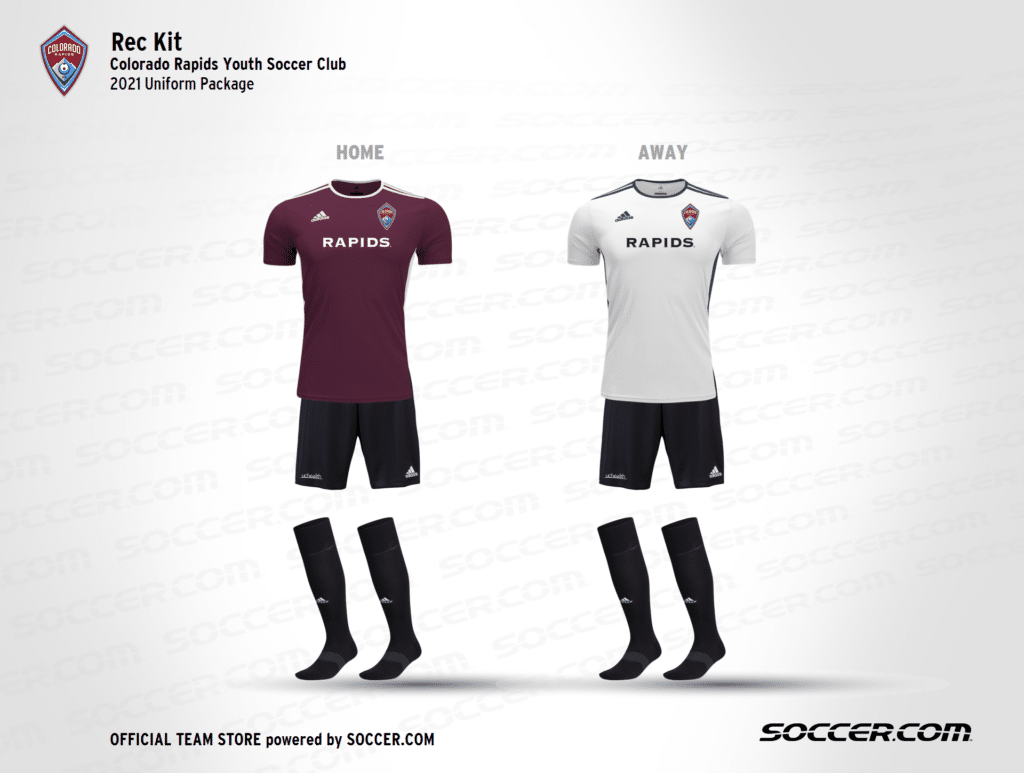
Rapids Youth Soccer partners with Soccer.com for all uniform needs. All CRYSC recreational players are required to purchase the uniform kit (white top, burgundy top, black shorts, and black socks) before the first game. We recommend ordering at least three weeks prior to their first game to ensure they have it in time for game day. Players are required to wear the official CRYSC jersey combo for games. This uniform kit is usable throughout all recreational programs.
It is important to note that uniforms are NOT included in registration costs. Additionally, uniforms are unavailable to purchase on-site at any CRYSC office – they must be purchased online via Soccer.com.
The 11U-19U Recreational league builds on the philosophy of the 9U-10U program by providing an environment where players find both success and challenges. Teams play 9v9 in the CSA Front Range League. Teams are placed in divisions based on coach feedback and historic game information from CSA.
Teams generally consist of 12-15 players. These teams are coached by parent-volunteers who follow a curriculum provided by Program Directors to run training sessions. Teams practice twice per week (60 minutes each) and play games on Saturdays in the Front Range League which requires travel for away games. Teams play 8-9 games each season.
Each team gets 8-9 games each season during the 9-10 week season. Some weekends may consist of double-header games with a small break in-between games. This will eliminate the need for makeup games on weeknights and Sundays, maximizing the soccer experience and family time.
The Fall season runs from September through the first week of November, and the Spring season from March through May.
The 11U-19U Rec+ Training program builds off the Recreational program with a Rapids Youth staff coach training the teams during the week. Teams still train at centralized locations across Denver. The staff trainer will work with teams twice per week following the age group curriculum provided by the Program Director. A parent volunteer leads the team during the Saturday games.
Teams generally consist of 12-15 players. These teams are coached by parent-volunteers who follow a curriculum provided by Program Directors to run training sessions. Teams practice twice per week (60 minutes each) and play games on Saturdays in the Front Range League which requires travel for away games. Teams play 8-9 games each season.
Each team gets 8-9 games each season during the 9-10 week season. Some weekends may consist of double-header games with a small break in-between games. This will eliminate the need for makeup games on weeknights and Sundays, maximizing the soccer experience and family time.
The Fall season runs from September through the first week of November, and the Spring season from March through May.
- 11U-19U Recreational
-
The 11U-19U Recreational league builds on the philosophy of the 9U-10U program by providing an environment where players find both success and challenges. Teams play 9v9 in the CSA Front Range League. Teams are placed in divisions based on coach feedback and historic game information from CSA.
Teams generally consist of 12-15 players. These teams are coached by parent-volunteers who follow a curriculum provided by Program Directors to run training sessions. Teams practice twice per week (60 minutes each) and play games on Saturdays in the Front Range League which requires travel for away games. Teams play 8-9 games each season.
Each team gets 8-9 games each season during the 9-10 week season. Some weekends may consist of double-header games with a small break in-between games. This will eliminate the need for makeup games on weeknights and Sundays, maximizing the soccer experience and family time.
The Fall season runs from September through the first week of November, and the Spring season from March through May.
- 11U-19U Rec+ Training
-
The 11U-19U Rec+ Training program builds off the Recreational program with a Rapids Youth staff coach training the teams during the week. Teams still train at centralized locations across Denver. The staff trainer will work with teams twice per week following the age group curriculum provided by the Program Director. A parent volunteer leads the team during the Saturday games.
Teams generally consist of 12-15 players. These teams are coached by parent-volunteers who follow a curriculum provided by Program Directors to run training sessions. Teams practice twice per week (60 minutes each) and play games on Saturdays in the Front Range League which requires travel for away games. Teams play 8-9 games each season.
Each team gets 8-9 games each season during the 9-10 week season. Some weekends may consist of double-header games with a small break in-between games. This will eliminate the need for makeup games on weeknights and Sundays, maximizing the soccer experience and family time.
The Fall season runs from September through the first week of November, and the Spring season from March through May.
Rapids Youth Soccer=
Every team is required to provide a volunteer coach to coach the team throughout the season. The volunteer coach is almost always a parent of a player on the team.
The coach will be provided with a curriculum from our staff for every session and will be provided with other training opportunities throughout the season. Our staff will help support every coach throughout the season, so even if coaches have never played soccer before, we can help you have a successful season. We recommend that each team has a coach and an assistant coach at this age to help players stay engaged throughout every session.
Coach Expectations
- Lead every practice session of find a substitute if they cannot be present.
- Coach every game of find a substitute if they cannot be at the game.
- Find a practice location and time that works for them and their team.
- Communicate clearly with the team throughout the season.
Coach Education Opportunities
- Rapids Youth provides coaching sessions for all coaches throughout the season.
- A website with additional coaches resources available to all coaches.
- One-on-one support to talk through drills and game setup.
- Pre-season meetings and coaching educational meetings.
Team managers are a very important piece to the success of any youth soccer team. In order to take some of the responsibilities off of the coach’s plate, teams are requested to have a team manager volunteer to organize the team for the season.
Team Manager Responsibilities
- Working with the coach to communicate with the team about sessions and games.
- Setting up a snack rotation for the season.
- Setting up pictures with the club’s photographer on picture day.
- Setting up an end-of-season party for the team.
Club Support for Team Managers
- One-on-one support if you have any questions or concerns.
- Educational opportunities at meetings and in person about next steps for the team.
- An administrative staff to provide any support you need.
- Coach Volunteer
-
Every team is required to provide a volunteer coach to coach the team throughout the season. The volunteer coach is almost always a parent of a player on the team.
The coach will be provided with a curriculum from our staff for every session and will be provided with other training opportunities throughout the season. Our staff will help support every coach throughout the season, so even if coaches have never played soccer before, we can help you have a successful season. We recommend that each team has a coach and an assistant coach at this age to help players stay engaged throughout every session.
Coach Expectations
- Lead every practice session of find a substitute if they cannot be present.
- Coach every game of find a substitute if they cannot be at the game.
- Find a practice location and time that works for them and their team.
- Communicate clearly with the team throughout the season.
Coach Education Opportunities
- Rapids Youth provides coaching sessions for all coaches throughout the season.
- A website with additional coaches resources available to all coaches.
- One-on-one support to talk through drills and game setup.
- Pre-season meetings and coaching educational meetings.
- Team Manager Volunteer
-
Team managers are a very important piece to the success of any youth soccer team. In order to take some of the responsibilities off of the coach’s plate, teams are requested to have a team manager volunteer to organize the team for the season.
Team Manager Responsibilities
- Working with the coach to communicate with the team about sessions and games.
- Setting up a snack rotation for the season.
- Setting up pictures with the club’s photographer on picture day.
- Setting up an end-of-season party for the team.
Club Support for Team Managers
- One-on-one support if you have any questions or concerns.
- Educational opportunities at meetings and in person about next steps for the team.
- An administrative staff to provide any support you need.
Volunteers
Staff
Field Coordinators
Kick-Arounds
Tournaments
Tryouts
Preparing for Tryouts
Players participating in the 11U – 19U recreational league that are interested in joining the Competitive program at Rapids Youth Soccer should reach out to the staff to indicate an interest in joining the competitive program.
Rapids Youth Soccer puts a lot of focus on the ongoing evaluation process, meaning staff would like to see players throughout the entire year to gauge their development level to properly assist in placing the player into the Competitive program.
- Parent-Volunteers | Parent-volunteer notes are collected throughout the season.
- Staff-Coaches | Staff-coach forms are submitted at the end of all staff-led programs.
- Field Coordinators | Field Coordinator forms are submitted weekly to the program DOC.
- Tournaments | Many recreational teams participate in tournaments where staff are able to observe them.
- Tryouts | Tryouts are held in late May, early June every year and are the final piece to the Player Placement process.
Helpful Links: What’s Next For Your Player
The difference between the two programs, is that the Recreational program is led by a parent volunteer and the Rec Plus program has a staff coach for the 2 weekly training sessions and game day is led by a parent volunteer. Both programs follow the same curriculum.
There are many differences between Competitive and Rec soccer. One of the biggest factors is the level of commitment. Many Competitive players are devoted mainly to the sport of soccer and enjoy the competitiveness of the atmosphere. Additionally, Competitive teams are coached by professional coaches hired and managed by the Rapids staff. Competitive teams also train more often than recreational teams.
Soccer has two seasons, one in the fall and one in the spring. The beginning of the soccer year is in the fall with the remainder of the year taking place in the spring. Most recreational registrations are season-by-season, with some recreational and competitive leagues a full-year registration. During the summer and winter off-season we offer a variety of camps for players to continue to improve upon their skills.
Yes, uniforms are required for players to play. Members can click here to be brought to the CRYSC uniforms page. This page details the ordering process for each program with specific program links to order uniforms.
- Required: Players are required to wear shin guards and soccer cleats. Only Soccer Start players can opt for athletic shoes instead of cleats.
- Recommended: Players should bring their own water and wear appropriate athletic clothing to practices. Players should have their own soccer balls which should also be brought to each practice (see below).
- Soccer Start through 8U need a size 3 ball
- 9U – 12U need a size 4 ball
- 13U – 18U need a size 5 ball
Definitely! We will do our best to place your child according to your request. However, we cannot guarantee special placement. The best way to ensure your child plays on the team or with the teammate you want is to register early.
- We work hard to ensure that all children that wish to play soccer are given an opportunity to play regardless of their family’s financial circumstances.
- Each year, the club provides need-based grants to players that would not be able to play without financial assistance. Annual grants range in amount depending on available resources, and range from 10% of registration fees to 50% of registration fees. Grant amounts are awarded based on demonstrated financial need.
- Any player interested in obtaining financial assistance must complete a financial aid application. Click here for more information.
- Application fees are 10% of the recreational fees for rec players and the first deposit for competitive players
- Families that wish to ensure that all children are able to participate in Colorado Rapids Youth Soccer Club programming may make tax-deductible contributions to our grant program by contacting Eric Fehr ([email protected]).



